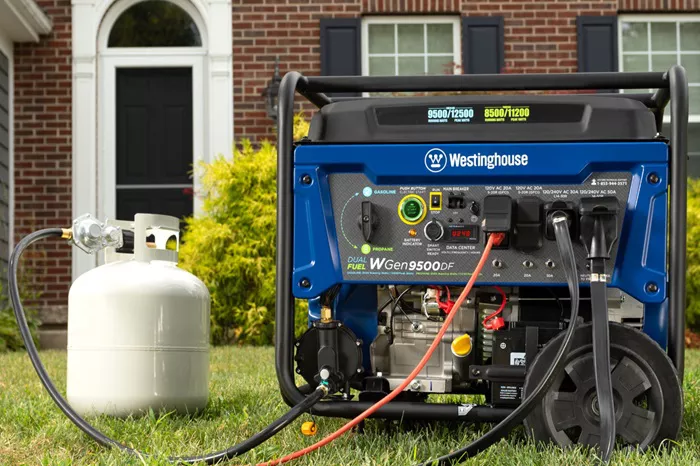Mobile homes often rely on grid power, but during outages, a generator can be a lifesaver. Connecting a generator to a mobile home requires careful planning to ensure safety and efficiency. This guide covers everything you need to know—from choosing the right generator to proper wiring and safety precautions.
Understanding Generator Types for Mobile Homes
Before connecting a generator, it’s important to choose the right type.
Portable Generators
- Best for short-term use.
- Typically range from 3,000 to 8,500 watts.
- Require manual startup and fueling.
Inverter Generators
- More fuel-efficient and quieter.
- Ideal for sensitive electronics.
- Usually range from 2,000 to 4,000 watts.
Standby Generators
- Permanently installed.
- Automatically turn on during outages.
- Provide higher power output (7,500 watts and above).
For most mobile homes, a portable or inverter generator is sufficient unless long-term backup is needed.
Calculating Your Power Needs
Before connecting a generator, determine how much power your mobile home requires.
List Essential Appliances: Include refrigerators, lights, HVAC systems, and medical equipment.
Check Wattage Ratings: Most appliances have labels showing their wattage.
Calculate Total Wattage: Add starting (surge) and running wattage.
Example Calculation
Refrigerator: 800W (running), 1,200W (starting)
Lights: 200W
HVAC: 1,500W (running), 3,000W (starting)
Total Needed: At least 4,400W to handle surges.
Choose a generator with at least 20% extra capacity to avoid overloading.
Safety Precautions Before Connection
Generators produce deadly carbon monoxide (CO) and must be used safely.
Key Safety Tips
Never run a generator indoors: Keep it at least 20 feet away from the home.
Use a CO detector: Prevents carbon monoxide poisoning.
Avoid backfeeding: Never plug a generator directly into a wall outlet without a transfer switch.
Ground the generator: Follow local electrical codes to prevent shocks.
Methods to Connect a Generator to a Mobile Home
There are three main ways to connect a generator safely:
Using a Transfer Switch
A transfer switch is the safest and most professional method.
Steps
Install a Manual Transfer Switch: Hire a licensed electrician to wire it into your mobile home’s electrical panel.
Connect the Generator: Plug the generator into the transfer switch using a heavy-duty extension cord.
Switch to Generator Power: Turn off the main breaker before activating the generator.
Pros
- Prevents backfeeding (which can electrocute utility workers).
- Allows selective power to essential circuits.
Using an Interlock Kit
An interlock kit is a cheaper alternative to a transfer switch.
Steps
Install the Kit: A metal plate prevents the main breaker and generator breaker from being on simultaneously.
Connect via Inlet Box: Wire a power inlet box to the panel.
Plug in the Generator: Use a generator cord to connect.
Pros
- More affordable than a transfer switch.
- Still prevents backfeeding.
Direct Extension Cord Connection (Least Recommended)
For very small loads, you can plug appliances directly into the generator.
Steps
Use Heavy-Duty Cords: Ensure they are rated for outdoor use.
Avoid Overloading: Only power a few devices at a time.
Cons
- High risk of tripping circuits.
- Not suitable for whole-home backup.
Wiring and Grounding the Generator
Proper grounding prevents electrical shock.
How to Ground a Generator
Check Local Codes: Some generators are already grounded and don’t need extra grounding.
Use a Grounding Rod: If required, drive an 8-foot copper rod into the earth.
Connect a Ground Wire: Attach a copper wire from the generator’s grounding terminal to the rod.
Maintaining Your Generator
Regular maintenance ensures reliability.
Change Oil Regularly: Every 50-100 hours of use.
Check Fuel Levels: Use fresh gasoline or propane.
Test Monthly: Run the generator for 15-20 minutes to keep it functional.
Conclusion
Connecting a generator to a mobile home requires careful planning, proper equipment, and safety measures. A transfer switch or interlock kit is the best method for safe, long-term use, while extension cords work for emergencies. Always follow electrical codes and prioritize safety to avoid hazards. By following this guide, you can ensure your mobile home stays powered during outages without risking damage or injury. If unsure, consult a licensed electrician for professional installation. Would you like recommendations for specific generator models for mobile homes? Let us know in the comments!

